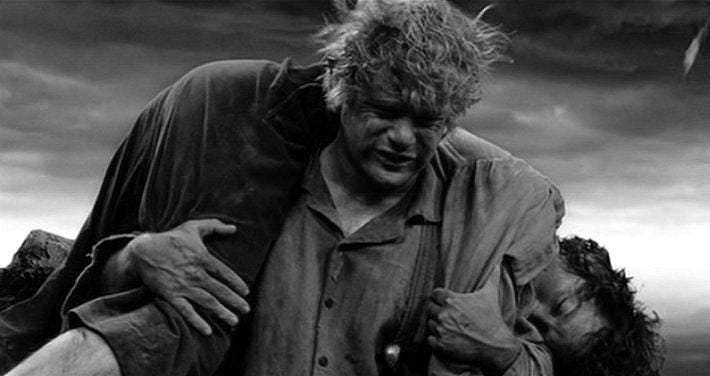07: nested ethics (why prospect theory is incomplete, the epistemic privilege of perspective; we're dolls all the way down)
heads up... this is about a 10-12 min read, but I've voice recorded it too <3
i was in an entrepreneurship masterclass last week about customers’ cognitive bias. the presenter discussed daniel kahneman’s prospect theory, which says that humans are generally extremely hesitant to give up what we already have in exchange for an (uncertain) future reward.
but is risk aversion always a weakness of human thinking? what if self-preservation is important? at the same time, i have friends who i wish were more risk tolerant (i.e. they should take the leap from their corporate job that they’ve been complaining about for years), and others who i know should be a bit more thoughtful about which risks are worth taking (e.g. is this the best time to go try out graduate school if you want to go into industry?). often, people are weighing considerations i have no business opining on; for instance, i have friends who i think are rightfully risk averse because they have kids and face an uncertain job market - now might not be the time to quit their job.
this makes me wonder if what economists call ‘irrational’ risk aversion actually reflects deeper evolutionary logic. maybe our psychological biases evolved not just to help individuals survive, but to help groups survive - which would explain why our risk calculations instinctively change when we’re thinking about dependents or community obligations. so, i’ve suspected that prospect theory assumes purely individual decision-making; once you begin accounting for the people who depend on that individual, or the people the individual is loyal to, the risk calculations change entirely.
group evolution: we don’t evolve alone…
group evolution theory suggests we didn’t evolve as individuals, but as groups. some behaviors benefit your personal survival but harm your group’s wellbeing over time. others behaviors might benefit the group but would be unsustainable for an individual acting alone. i tried to find some good examples of this, the recommendations i got were two movies i’d never seen (dang!), so i watched them for this post. :) those who know my evolving relationship with film i know/hope are proud of meeeee.
first example: lord of the rings’ frodo and sam
In The Return of the King, when frodo can no longer move, sam says: "I can't carry it for you... but I can carry you." he lifts frodo and climbs mount doom.
individual level: this is "irrational." sam gets no personal glory, but carrying Frodo is worth it to him
group level: sam's sacrifice is necessary for the mission to be complete: saving Middle-earth. his loyalty is not adaptive for individual survival, but is quite literally essential for group survival.
a second example: The Barbershop
in the film barbershop (2002), calvin palmer could sell his inherited barbershop for $90,000—solving all his financial problems. but watching how the shop functions as a community hub, he declines the offer.
the barbershop is effectively a community center, it employs people, and it gives at least one character a second chance at building a career at the shop after leaving prison.
individual level: rejecting $90k is financially irrational for calvin. yes, he was trying to make his wife and future child happy, but literally everyone else in his life was disappointed in him. he was seeing the decision at the group level.
group level: it’s implied at the end that because calvin chose to put his community first, he ends up being taken care of, too. i would need to watch the barbershop 2 to know how well this works out for them.
alright, one more example…
a final example: my friend who wrote-in the 2024 Nov election to avoid family drama
a friend of mine faced a politically divided family last november during the election. to keep peace at home, she decided to not vote for either of the candidates but write in someone else. i was honestly a bit surprised that she did this considering how politically informed and convicted she is. but she told me she wasn’t particularly enthusiastic about either candidate, she still wanted to vote, and avoiding (further) conflict with her family was worth it. her parents are the type of people who would blame her if trump won; no vote would be a vote for trump.
when discussing this, i shared an analogy to help illustrate my more-international & less-local perspective (i was already thinking about the nested doll framework at this point): imagine someone in your household running for city congress. their win would get your kids into the best classes or programs, but their policies would cut community services that your neighbors rely on. would you vote based on what's best for your family, or what's best for the broader community? she told me that this helped her see the tension i was feeling between respecting her decision and simultaneously being very disappointed by it.
when i connected this the global lens through the analogy, she responded that while she’d been thinking about the implications of the election for Israel and the Middle East, she'd never considered the international implications of the election outcome in the way that I had. i can honestly say i didn't know what i'd do in her situation, and i completely understood her choice. for me, though, i can't help but think about the global impact of my politics. many of my closest friends aren't american, so US elections directly affect people i care about but who also have no voice in the process.
but this global lens, for me at least, still comes its own blind spots. i'm shamefully out of touch with local politics, probably to the detriment of my own community. unlike my friend, i also don't have to choose between my political convictions and family peace since we're largely aligned.
so, for that friend there’s tension between the… individual/family level and the national/global level. in following up with her, she also mentioned how her “feminist survival guilt” makes it a major internal conflict, too. at the same time she said that she doesn’t vote for the country as a whole anymore because it let her down last time; she votes for her personal community, which she knows will offend other people. so many layers !

the dolls within dolls
our environments hand you a doll—and train you to live inside it.
some dolls are small: you, your metrics, your performance. others are bigger: your team, your family, your identity group. a few are vast: the organization, the system, the society, the species.
not every doll contains the others. some organizational "dolls" are sealed shut. they don't hold history or point outward. you're encouraged to optimize—but only within your shell. if you outgrow that doll and start asking bigger questions, you might be told you're "doing too much" or "overstepping."
in a set of russian nesting dolls, the innermost doll is the only solid one. it's the anchor that gives the whole structure stability. this holds true for nested ethics as well. without a solid center—a grounding in your own humanity—it becomes harder to consider everything else. i've seen leaders who can analyze global trends but can't read the room in a simple meeting. their disconnection from immediate human realities undermines their effectiveness at every level.
the more familiar you are with your own moral calculus, sensitivities, and commitments, the easier it becomes to understand what's happening at other levels. having this lens doesn't simplify ethical dilemmas; it probably complicates them. but it provides a steady reference point from which to navigate them
the privilege (and/or power?) of perspective
there's some privilege involved in which level we can see, and therefore optimize for:
can I afford to prioritize the world, or must I focus on my household?
do you have bandwidth to think beyond today?
do I know enough about the system to protect its future?
some of us are forced to think locally. others are allowed to think globally.
this got me thinking about how our environments shape which ethical levels we’re trained to consider.
how our environments shape how we act out ethics
as y'all know, my posts typically come back to the systems we build and inhabit. when we judge someone for being "selfish" or "short-sighted," we're often missing how their environment has shaped what they're able to see and consider.
most environments won't explicitly tell you what level to optimize for, but they train you implicitly through whose feedback you receive, whose outcomes you witness, what stories are celebrated, and whether you're ever connected with people downstream from your decisions.
your workplace might train you to think only about your metrics, not the whole organization. or your school might focus you on your child’s individual achievements, not on creating a community where children building the skills to acquire knowledge through relationships is a norm down the road, etc.
i used to think of these as personal failings or moral tensions, but i think the problem is much bigger. we can't blame individuals for having a myopic lens when the systems around them actively narrow their field of vision.
modern organizations and systems continue to decouple these layers. i think that’s pretty dangerous. modern systems are designed in ways that separate these different levels from each other, and make it harder to notice how they interact with each other. you might work for a company that only measures quarterly profits (decoupled from longer-term impact on the local community), or live in a political system that focuses on national interests (decoupled from global consequences or the needs of nuclear families), or you might attend a school that prioritizes individual achievement (decoupled from collective wellbeing).
this is also a question of epistemic justice — your ability to think at different levels and see how they're connected depends on access to experiences, relationships, and knowledge that not everyone has. some people are forced to think locally while others have the privilege to think globally. the systems that shape our ethical perspectives influence what we see and what we’re capable of seeing in the first place.
i’m tempted to end with a call to action, but — truthfully — this essay was a detangling exercise for me. the process of writing this over the past couple of weeks has helped me build an inner-vocabulary that helps me make sense of the tensions i feel, and empathize with (or call out) the ones I sense in others. if anything, i’ve found that conversations about ethics become more productive when we question whether we’re talking about the same dolls.

thanks for reading! hope some bit of this is helpful to you, too. - Kayla








Ethics is nothing without epistemology -- great essay!